We hope your summer is going well. WABA’s Advocacy team has been busy! Here’s our latest quarterly Prince George’s County advocacy update, #3 for 2024.
We’ll start with a bit of WABA news: Jeremiah Lowery’s last day as advocacy director was July 22. Jeremiah is joining Legal Aid DC, and WABA Senior Organizing Manager Kalli Krumpos is serving as acting advocacy director.
First up, two up-coming events, two ‘save the date’ items, and a quick look-back at two recent WABA Prince George’s County events…
Events
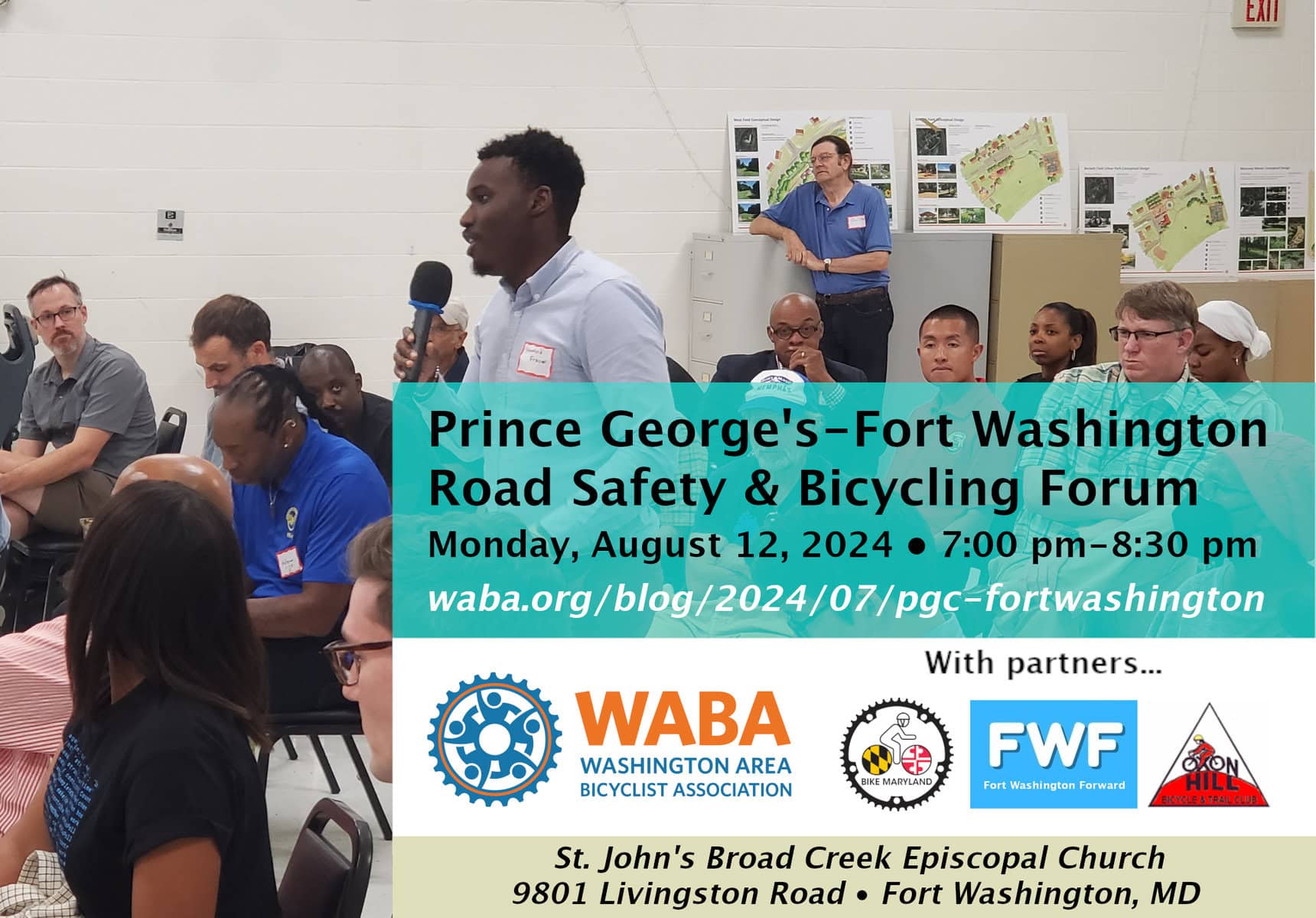
- WABA is hosting a Prince George’s–Fort Washington community road-safety and bicycling forum on Monday evening, August 12, 7 pm to 8:30 pm at St. John’s Episcopal Church on Livingston Road in Fort Washington. Southern Prince George’s County faces transportation challenges that affect residents, businesses and employees, visitors, and the quality of life. Indian Head Highway/MD 210 is particularly unsafe, southern PGC transit falls short, and the area lacks safe pedestrian and bicycling infrastructure. If you’d like to be part of our southern PGC advocacy work, please join us on August 12.
- Second, WABA is co-hosting a New Carrollton safety walk, Monday evening, September 16, 5:30 pm to 7:00 pm, in cooperation with the City of New Carrollton, Prince George’s County Councilmember Eric Olson, and local advocates. The community is divided by the Capital Beltway and by MD 450/Annapolis Road, a major state highway with dangerous crossings and sidewalkless stretches. Our aims are to boost walking and bicycling in the area and advance creation of safe streets for all. The September 16 safety walk will identify challenges and explore solutions.
And Save the Date:
- WABA will hold a Prince George’s County ice-cream ride on Saturday, August 24, ice-cream location TBD so we don’t have a registration page up yet. This will be a members-only event, so hint: Now’s a good time to check whether your membership is current – you can do that by scrolling down at waba.org/members/ and renew via that page if you’d like to (re-)join – and check waba.org/fun closer to the ride date for event details.
- WABA is supporting an October 5 Fort Washington placemaking event being organized by our friends at Fort Washington Forward. Visit www.fwforward.org/ in September for event information.
We’ll list a few additional events of interest toward the end of this update. We’ll continue for now with an announcement and look-ahead…
WABA’s Vision Zero Youth Leadership Institute
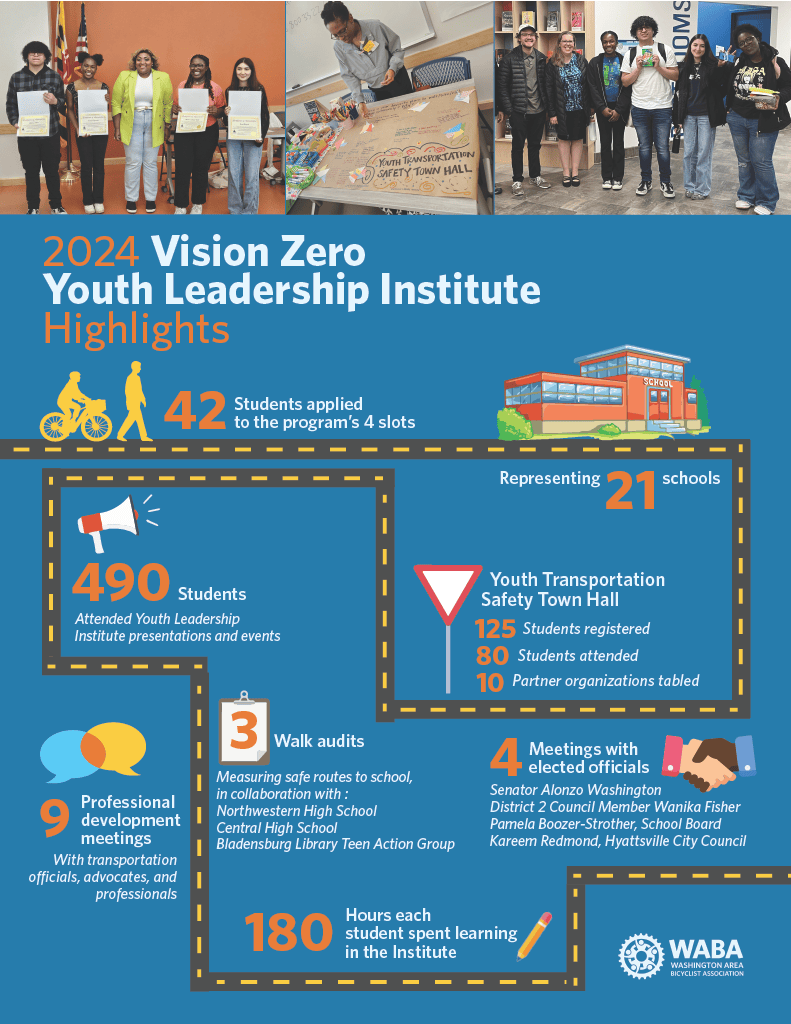
WABA is excited that our partnership with Maryland Department of Transportation, Motor Vehicle Administration’s Highway Safety Office continues for its second year, to fund WABA’s Vision Zero Youth Leadership Institute, a paid-internship program for Prince George’s County high school students to act as student-ambassadors for Vision Zero policy and programs.
This last school year, the project reached 490 students across the county. WABA organized community events, walk audits, and town hall meetings to educate students about vulnerable road users and safe behaviors and to empower students to organize their own walk audits in their communities.
This next school year, six students will take part in the program. They will work in pairs to conduct outreach to school and community leaders and fellow students, again to educate the community on vulnerable road user safety, and they will put on community events to empower others to become Vision Zero leaders in their respective communities.
Be on the lookout for three bike rodeo events in the county, student-led walk audits of roads most unsafe for vulnerable road users, and for the students to organize the second Youth Transportation Safety Summit, in partnership with community and government agencies.
For further information, please get in touch with WABA’s Prince George’s County Youth Organizer Joseph Hamd, at joseph.hamd@waba.org.
Next, other key Advocacy Team activities in or related to Prince George’s County…
Summer Advocacy Focus #1: Complete State Roads and MDOT’s New Complete Streets Policy
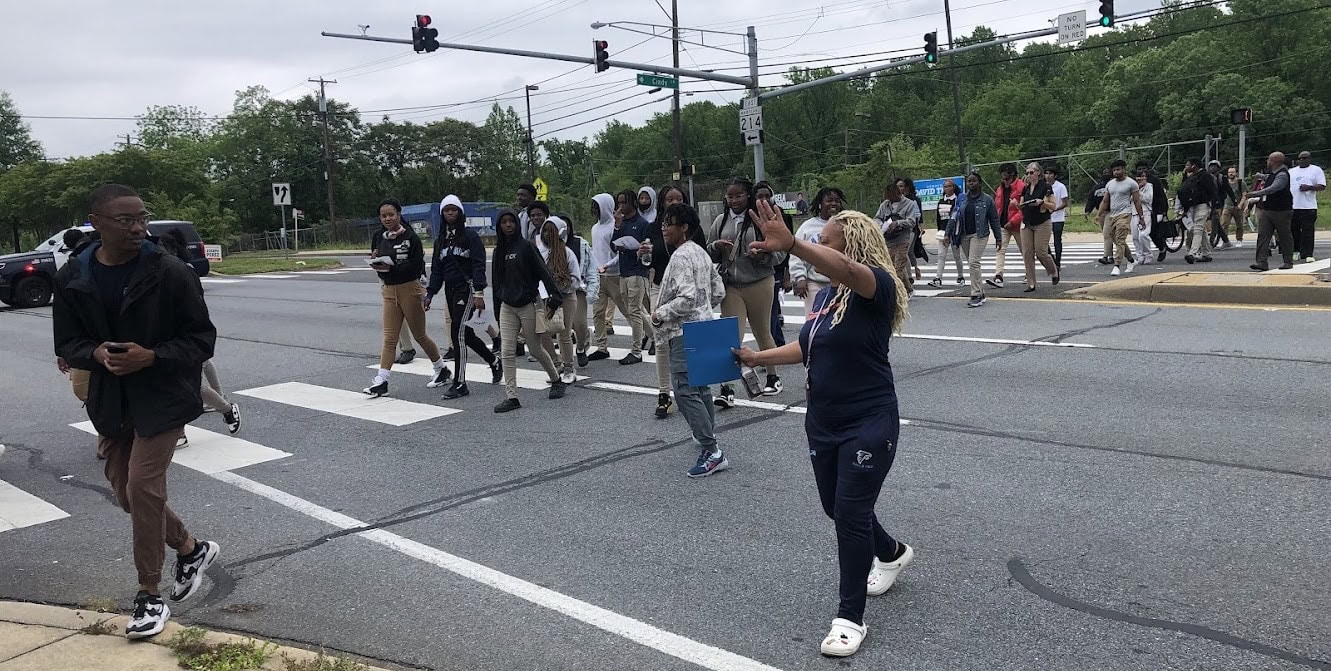
WABA launched our Complete State Roads–Prince George’s County (CSR-PGC) safety initiative at the May 18 Prince George’s County Bike Summit. (There’s more on the summit below.)
WABA is a big believer in complete streets, roads (re-)designed to be safe and usable for pedestrians, bicyclists, rollers, and transit users and not just motor vehicles. An ideal complete street will offer sidewalks and safe pedestrian crossings, protected bike lanes or sidepaths, and, when appropriate, dedicated bus lanes. We even launched an initiative to promote conversion of state roads, which are the most dangerous in Washington DC-area jurisdictions, into complete streets.
The Complete State Roads initiative serves as a framework for our Prince George’s County state advocacy. To learn more, view an introduction presentation online and check out a longer, document version. Note that it’s a review draft; we’d welcome your comments. Get in touch with Maryland Organizer Seth Grimes at seth.grimes@waba.org.
MDOT’s new Complete Streets policy
We’re thrilled with MDOT’s new Maryland Complete Streets policy, launched on June 6, 2024. We’ll call out one of the four goals:
Require the implementation of planning and design principles from Maryland Department of Transportation (MDOT) Maryland Transit Administration’s (MTA) Bus Stop Design Guide, and State Highway Administration’s (SHA) Context Driven: Access and Mobility for All Users Guide, or Context Guide, to address safety, access, and mobility for all users on all projects in MDOT right-of-way in the following cases:
i. When implementing a capital improvement project, such as construction or reconstruction of a roadway, intersection, or bridge.
ii. When permitting new or reconstructed streets to access MDOT right-of-way; or
iii. When there is an opportunity to improve safety for all users by applying proactive engineering safety countermeasures to resurfacing projects.
‘Context Driven’ and the SHA’s Pedestrian Safety Action Plan
MDOT’s Complete Streets policy references the SHA’s ‘Context Driven’ guidelines and toolkit. Context Driven “is a planning and design resource offering practitioners guidelines centered on establishing safe and effective multi-modal transportation systems.” In practice, it describes safety countermeasures appropriate for application in “contexts” ranging from dense “urban core” areas to rural areas.
We met with then-State Highway Administrator Tim Smith and senior staff, regarding Context Driven and SHA projects, back in May 2023, and with Smith’s successor Will Pines in December 2023 and again a few weeks ago, on July 15.
WABA backed our partners at the Coalition for Smarter Growth in recruiting Montgomery and Prince George’s County support for revisions to Context Driven to better reflect on-the-ground conditions and local plans for transit-oriented development and densification. We supported the development of a letter from the two counties’ planning and transportation directors to Administrator Pines, sent in May, and we were pleased with Mr. Pines’ July response.
We are also pleased with the SHA’s aggressive steps to implement Pedestrian Safety Action Plan (PSAP) recommendations. Back in December, the SHA announced the first five PSAP-implementation projects – improvements to New Hampshire Avenue/MD 650 between University Blvd./MD 193 and a short distance south of the Capital Beltway/I-495 are slated for completion by the mid 2026 – and additional PSAP projects will be announced soon.
We’ve had many fruitful discussions with the engineering and safety staff planning and managing the SHA’s safety work, and we appreciate their efforts. So we’ll take a small amount of credit for encouraging the development and adoption of MDOT’s and the SHA’s new policies, via our recent years’ advocacy work.
Summer Advocacy Focus #2: 2025 Maryland State Legislation
While the 2025 Maryland state legislative session doesn’t open until January 8, WABA is developing our 2025 legislative agenda. We’re working with allies and legislators to confirm reintroduction of a number of bills that didn’t pass in 2024, and to develop new bills and identify sponsors for official drafting and introduction. Bills that are “pre-filed”(drafted and ready before the start of the legislative session) enjoy a timing advantage. Also, local bills – state bills that apply to a single county – must be presented to the county’s legislative delegation for fall discussion and approval.
We have confirmed reintroduction of several bills that passed the House in 2024 but stalled in the Senate:
- Bicycle Safety Yield (a.k.a. Stop as Yield), boosting bicyclist safety and smoothing traffic flow by allowing a bicyclist to proceed past a stop sign, yielding to pedestrians and motor vehicles as required.
- Bikes On Sidewalks, changing the default statewide to allow riding on the sidewalk, an important safety step for higher speed roads without bike lanes.
- The Transportation and Climate Alignment Act, which would require mitigation of the greenhouse gas (GHG) and vehicle miles traveled (VMT) impact of major transportation projects.
We expect reintroduction of two other bills that didn’t pass in 2024:
- Electric Bicycle Rebate and Voucher Program.
- The Great Maryland Trails Act, establishing a state trails office.
New bills we are discussing with legislators include:
- Eliminating Contributory Negligence for Vulnerable Road Users, including pedestrians and bicyclists. Currently if you’re injured in a collision but found even only one percent negligent, your ability to recover damages is severely limited. Maryland is one of only four states with this provision.
- No parking, standing, or stopping in a bike lane. Baltimore currently has a provision; the 2024 Better Bus Service Act would have extended this prohibition state-wide, but the bike-lane provision was stripped out of the bill by amendment.
We’re also involved in transportation-revenue discussions – the state faces a five year, $3 billion transportation funding shortfall – and we are discussing other road safety, pedestrian, and bicycling bills with legislators. We’d welcome your getting involved. Drop us a line!
Summer Advocacy Focus #3: 2025 Prince George’s County Project Priorities
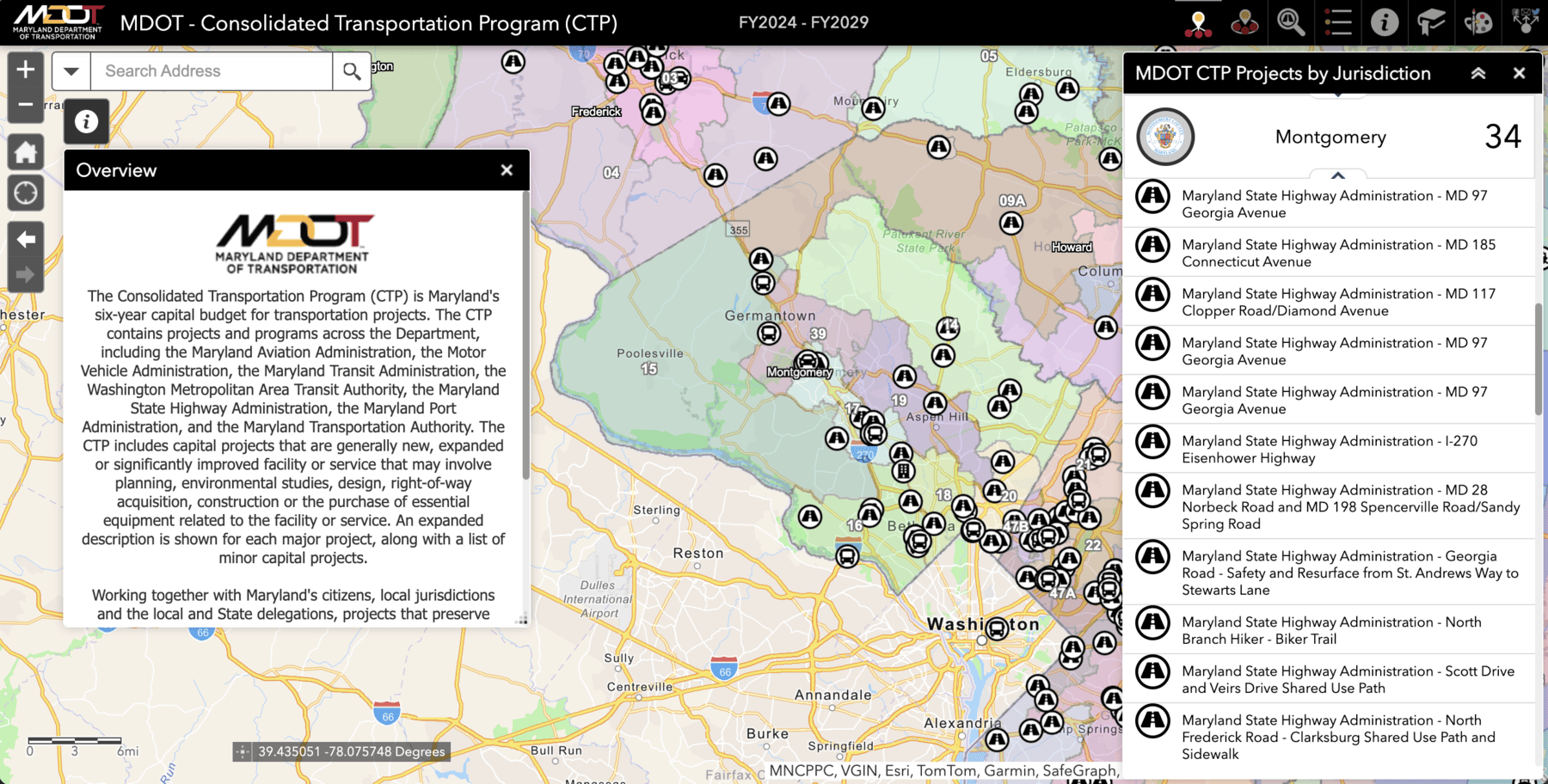
Each year, the state updates the six-year Consolidated Transportation Program (CTP), a catalog of major capital projects that are currently underway or planned for the near-ish future. The Maryland Department of Transportation (MDOT) invites CTP requests from the counties, conveyed via priority letters. Read our 2023 CTP testimony by clicking here.
An MDOT site provides a geographic display of CTP projects. Note the color-coding by state legislative district. Click on a project icon to be taken to the project page in the CTP document.
What Prince George’s County projects would you like to see added to the state CTP?
One we plan to suggest is the Maryland portion of the Fort Lincoln-Anacostia Riverwalk Trail connector project. Washington DC recently won a $25 million federal grant toward the $35 million cost of bikeways and a new pedestrian-bicyclist bridge across the river, next to the Route 50 bridge. It would come down across the Maryland border; the regional Transportation Planning Board recently approved $300,000 in federal Carbon Reduction Program funding, with a $75,000 (20%) state match, for engineering and design work to be conducted by the State Highway Administration.
County priorities
In addition, county agencies are already thinking about programs and capital investments they will make via the county FY26 Operating Budget and FY26 Capital Budget and FY26-FY31 six-year Capital Improvements Program. (Fiscal Year 2026 starts on July 1, 2025.) Two WABA priorities are:
- Equitable Bikeshare program expansion.
- Creation of a county e-bike rebate/voucher program.
We’re doing our best to stay on top of county projects. If you have particular concerns, please let us know.
Since our last advocacy update…
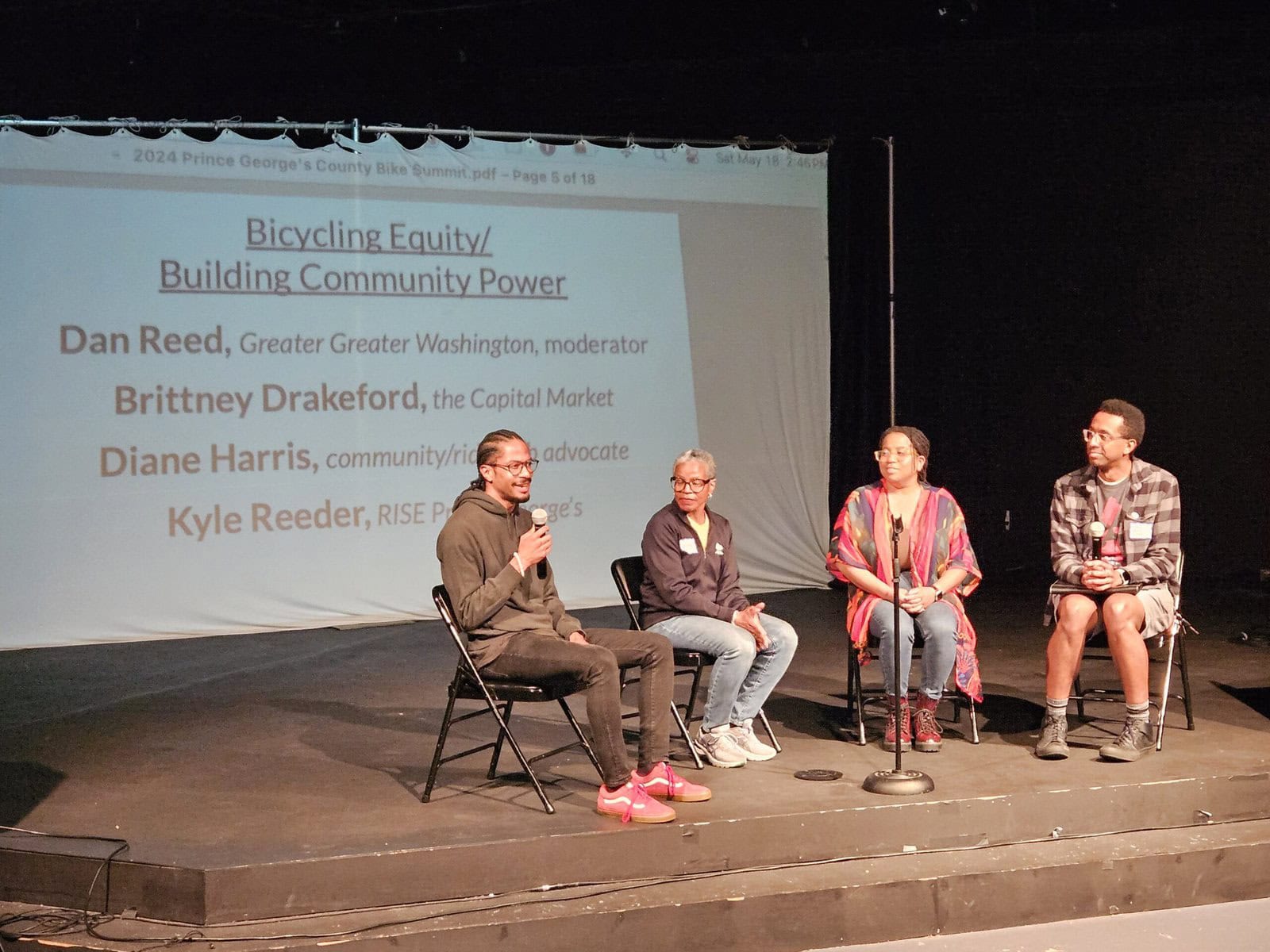
WABA’s first Prince George’s County Bike Summit took place Saturday afternoon, May 18, in Suitland. It went really well! County Council Chair Jolene Ivey delivered a welcome keynote – she’s a bike-lane ally – followed by a welcome from WABA’s Executive Director Elizabeth Kiker. The summit featured two discussion sessions, on Bicycling Equity/Building Community Power and on Expanding the Prince George’s County Bicycling Network, plus a couple of short presentations. Let’s plan to do it again next spring! Date and location are TBD.
And we held a fun and informative Prince George’s County bicycling advocates meetup at Proteus Bicycles in College Park, on July 7, joined by Sen. Jim Rosapepe (District 21), College Park Councilmember Alan Hew, Mount Rainier Councilmember Jarrett Stoltzfus, and twenty-five or so other Prince Georgians. Our thanks to Laurie and Jeff Lemieux at Proteus for hosting us! We’ll continue to organize these less-formal community events, around the county, time permitting.
On the agenda for the next couple of months…
- WABA is offering Youth Learn to Ride classes at Forest Hills Elementary School on September 7 and 14, 9 AM to 11 AM, and at Colin Powell Elementary School on September 28, 9 AM to 11 AM, and October 12, 10 AM to 12 noon. These classes are open to the public – contact education@waba.org – although our focus is town residents.
- The next Prince George’s Active Transportation Advisory Group (ATAG) meeting will be on Monday, September 9.
- Metro DC Car Free Day is Monday, September 23.
- Save the Date: WABA’s 2024 Cider Ride, along Prince George’s County and Washington DC trails, takes place on November 2.
Speaking out for bicycling and safer streets
We’d like to hear your thoughts about bicycling, pedestrian, and road-safety programming that the county should fund for the next fiscal year. Please send us a note at advocacy@waba.org and we’ll see what we can add to our advocacy agenda.
Finally, is your WABA membership current? If not, we’d love to have you (re)join. Just visit waba.org/join-2020/. WABA is member supported, and your contribution at any level – WABA membership dues are pay-what-you-can – will help us sustain our work and expand our community impact.